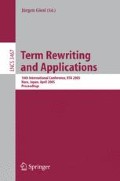Abstract
Quasi-interpretations are an useful tool to control resources usage of term rewriting systems, either time or space. They not only combine well with path orderings and provide characterizations of usual complexity classes but also give hints in order to optimize the program. Moreover, the existence of a quasi-interpretation is decidable.
In this paper, we present some more characterizations of complexity classes using quasi-interpretations. We mainly focus on small space-bounded complexity classes. On one hand, by restricting quasi-interpretations to sums (that is allowing only affine quasi-interpretations), we obtain a characterization of LinSpace. On the other hand, a strong tiering discipline on programs together with quasi-interpretations yield a characterization of LogSpace.
Lastly, we give two new characterizations of Pspace: in the first, the quasi-interpretation has to be strictly decreasing on each rule and in the second, some linearity constraints are added to the system but no assumption concerning the termination proof is made.
Access this chapter
Tax calculation will be finalised at checkout
Purchases are for personal use only
Preview
Unable to display preview. Download preview PDF.
References
Benzinger, R.: Automated complexity analysis of NUPRL extracts. PhD thesis, Cornell University (1999)
Hofbauer, D., Lautemann, C.: Termination proofs and the length of derivations. In: Dershowitz, N. (ed.) RTA 1989. LNCS, vol. 355, Springer, Heidelberg (1989)
Cichon, E., Lescanne, P.: Polynomial interpretations and the complexity of algorithms. In: Kapur, D. (ed.) CADE 1992. LNCS, vol. 607, pp. 139–147. Springer, Heidelberg (1992)
Bonfante, G., Cichon, A., Marion, J.Y., Touzet, H.: Algorithms with polynomial interpretation termination proof. Journal of Functional Programming 11 (2000)
Marion, J.Y., Moyen, J.Y.: Efficient first order functional program interpreter with time bound certifications. In: Parigot, M., Voronkov, A. (eds.) LPAR 2000. LNCS (LNAI), vol. 1955, pp. 25–42. Springer, Heidelberg (2000)
Bonfante, G., Marion, J.Y., Moyen, J.Y.: On lexicographic termination ordering with space bound certifications. In: Bjørner, D., Broy, M., Zamulin, A.V. (eds.) PSI 2001. LNCS, vol. 2244, p. 482. Springer, Heidelberg (2001)
Hofbauer, D.: Termination proofs with multiset path orderings imply primitive recursive derivation lengths. Theoretical Computer Science 105, 129–140 (1992)
Weiermann, A.: Termination proofs by lexicographic path orderings yield multiply recursive derivation lengths. Theoretical Computer Science 139, 335–362 (1995)
Ritchie, R.: Classes of predictably computable functions. Transaction of the American Mathematical Society 106, 139–173 (1963)
Beckmann, A., Weiermann, A.: A term rewriting characterization of the polytime functions and related complexity classes. Archive for Mathematical Logic 36, 11–30 (1996)
Marion, J.Y.: Analysing the implicit complexity of programs. Information and Computation 183, 2–18 (2003)
Bellantoni, S., Cook, S.: A new recursion-theoretic characterization of the polytime functions. Computational Complexity 2, 97–110 (1992)
Leivant, D.: Predicative recurrence and computational complexity I: Word recurrence and poly-time. In: Clote, P., Remmel, J. (eds.) Feasible Mathematics II, pp. 320–343. Birkhäuser, Basel (1994)
Leivant, D., Marion, J.Y.: Lambda calculus characterizations of poly-time. Fundamenta Informaticae 19, 167 (1993)
Jones, N.D.: LOGSPACE and PTIME characterized by programming languages. Theoretical Computer Science 228, 151–174 (1999)
Gurevich, Y.: Algebras of feasible functions. In: Twenty Fourth Symposium on Foundations of Computer Science, pp. 210–214. IEEE Computer Society Press, Los Alamitos (1983)
Oitavem, I.: A term rewriting characterization of the functions computable in polynomial space. Archive for Mathematical Logic 41, 35–47 (2002)
Amadio, R., Coupet-Grimal, S., Zilio, S.D., Jakubiec, L.: A functional scenario for bytecode verification of resource bounds. In: CSL. (2004) (to appear)
Amadio, R.M., Dal-Zilio, S.: Resource control for synchronous cooperative threads. In: CONCUR, pp. 68–82 (2004)
Bonfante, G., Marion, J.Y., Moyen, J.Y., Péchoux, R.: Synthesis of quasiinterpretations. Technical report, Loria (2005) Submited to RULE 2005, Available at http://www.loria.fr/~bonfante/publis/RULE05.pdf
Bonfante, G., Marion, J.Y., Moyen, J.Y.: Quasi-interpretations. Technical report, Loria (2004) Submited to Theoretical Computer Science, accessible: http://www.loria.fr/~moyen/
Huet, G.: Confluent reductions: Abstract properties and applications to term rewriting systems. Journal of the ACM 27, 797–821 (1980)
Grädel, E., Gurevich, Y.: Tailoring recursion for complexity. Journal of Symbolic Logic 60, 952–969 (1995)
Dershowitz, N.: Orderings for term-rewriting systems. Theoretical Computer Science 17, 279–301 (1982)
Krishnamoorthy, M.S., Narendran, P.: On recursive path ordering. Theoretical Computer Science 40, 323–328 (1985)
Arts, T., Giesl, J.: Termination of term rewriting using dependency pairs. Theoretical Computer Science 236, 133–178 (2000)
Bonfante, G., Marion, J.Y., Moyen, J.Y.: Quasi-interpretations and small space bounds. Technical report, Loria (2005), http://www.loria.fr/~bonfante/publis/RTA05f.pdf
Dershowitz, N.: A note on simplification ordering. Information Processing Letters 9, 212–215 (1979)
Bonfante, G.: Constructions d’ordres, analyse de la complexité. Thèse, Institut National Polytechnique de Lorraine (2000)
Author information
Authors and Affiliations
Editor information
Editors and Affiliations
Rights and permissions
Copyright information
© 2005 Springer-Verlag Berlin Heidelberg
About this paper
Cite this paper
Bonfante, G., Marion, JY., Moyen, JY. (2005). Quasi-interpretations and Small Space Bounds. In: Giesl, J. (eds) Term Rewriting and Applications. RTA 2005. Lecture Notes in Computer Science, vol 3467. Springer, Berlin, Heidelberg. https://doi.org/10.1007/978-3-540-32033-3_12
Download citation
DOI: https://doi.org/10.1007/978-3-540-32033-3_12
Publisher Name: Springer, Berlin, Heidelberg
Print ISBN: 978-3-540-25596-3
Online ISBN: 978-3-540-32033-3
eBook Packages: Computer ScienceComputer Science (R0)

